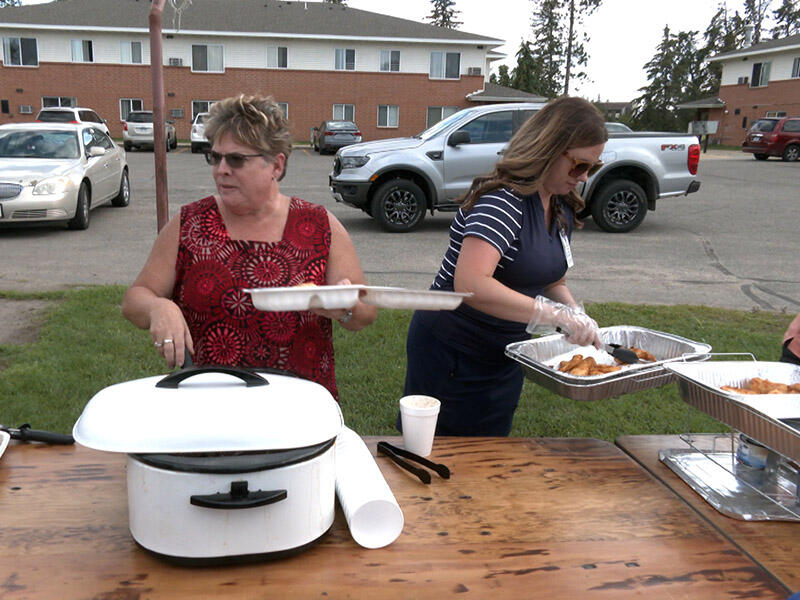The Ridgeway neighborhood in Bemidji, Minnesota, is known as one of the harder places to live in the region. One of the apartment buildings has been boarded up and covered in graffiti, while others have been neglected by their landlord and threatened with condemnation by the city. The low-income housing area has a reputation for higher crime rates and drug use.
Reclaiming Ridgeway
On this beautiful summer day though, residents of Ridgeway are out in their common area, mingling with each other, breaking bread with local law enforcement, and playing games thanks to the Rotary Ridgeway Initiative.
“The Rotarians and the people that live here might not have ever had an opportunity to connect with each other,” said Sandy Hennum, chairperson for the Ridgeway Initiative. “And now you have people connecting on a really deep level, playing games, talking about their day, talking about lives. They really start to understand that we’re so much more alike than we are different, and people start to trust each other. And once they start to trust each other, then we can listen to what each other has to say.”
Care beyond clinics: How Sanford Health partners with its communities
“It gets everybody active and everything, and getting to know everyone that lives around here,” said Ridgeway resident June Coller. “Even the trailer park can come and join in. And anybody’s welcome to participate and everything.”
Sanford’s community role
Sanford Health became involved with the initiative when people like Kayla Winkler saw an opportunity to reach out to an underserved part of the community.
“These are our patients that we’re trying to take care of every day and how do we help our patients in other ways besides health care?” said Winkler, a senior community relations specialist at Sanford Bemidji. “(This initiative is) helping with housing, it’s helping with food insecurities, we’re bringing care close to home. We are bringing providers here. We’ve done vaccine clinics here. And so we’ve just found a lot of really creative ways to help people who don’t have the same easy access that we do to seeking health care.”
Along with cookouts, the initiative and volunteers from Sanford have also helped with transportation, giving residents rides to the hospital or their local clinic. They’ve offered essential supplies, including diapers and feminine hygiene products to residents. And they’ve handed out school supplies to children who live here, while also working to ensure those students are up-to-date with their vaccines.
“There’s over 150 kids, children and teens, that live in this neighborhood,” said Andrea Kent, executive director of the Boys & Girls Club of the Bemidji Area. “It’s not just a handout. It is truly helping them access resources, access education for the betterment of themselves and for their family.”
Reason for optimism
The initiative does not claim to fix all of the problems in the neighborhood. But they do hope that partnerships like this one will bring positive change and a true sense of community throughout Bemidji.
“Health care affects so much. Housing affects so much,” said Hennum. “They might not have the support systems, the mechanisms to do that. But we can do it together. We can stand in the gap next to them and say, ‘OK, what do you need today?’ And then we can help them achieve that.”
Learn more
- Health advocate provides comfort, trust for Native patients
- Sanford Bemidji marks 10 years of serving northern Minnesota
- Sanford Health helps to fill backpacks and fight hunger
…
Posted In Bemidji, Community, Family Medicine, Here for all. Here for good.

